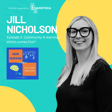Become a Creator today!Start creating today - Share your story with the world!
Start for free
00:00:00
00:00:01

Why Continuous Learning is Crucial to Entrepreneurs
In the latest episode of the Gamoteca Podcast, host Lauren Anders Brown dives into the unique world of entrepreneurship with Dr Becky Sage, Chief Operating Officer of Gamoteca and an experienced entrepreneur and mentor. Together, they explore how e-learning is transforming traditional education for entrepreneurs and reshaping how founders connect, learn, and grow.
Find more about Dr Becky Sage
Website: https://www.gamoteca.com
LinkedIn: https://www.linkedin.com/in/beckysage/
Transcript
Introduction to Entrepreneurship & Technology
00:00:00
Speaker
Being an entrepreneur is a unique journey where a human develops an idea to be used by other humans. But a lot of that development takes place without any other humans. I'm a startup founder myself and know this all too well. Because of this, we're seeing more movement towards harnessing technology to connect these entrepreneurs so they can learn from each other and develop their businesses faster. I'm Lauren Anders Brown, your host for this episode, and we're going to explore more about this topic with our guest speaker, Dr.
Impact of Human-Connected Learning Experiences
00:00:29
Speaker
Becky Sage.
00:00:38
Speaker
You're listening to How Humans E-Learn Together, discussing the impact human-connected, interactive experiences have on the human capacity to learn. This is a podcast for educators, learning and development professionals, coaches and mentors, the technology and design community, and anyone who wants to leverage new ways to reach lifelong learners. And a look at what others in the e-learning industry are doing to make that happen.
Becky Sage's Entrepreneurial Journey
00:01:04
Speaker
I'm here today with Dr. Becky Sage. Hi.
00:01:09
Speaker
Becky is an entrepreneur, a startup founder, and now a mentor of founders. and i mean i definitely always really valued those kind of on the corridor kind of water cooler type kind of conversations with other entrepreneurs. So we were physically um in ah in aner in an incubator space. And that was really important to me. And in fact, that's what inspired me to start my first podcast, which is called Mind Styling, because like it was all these conversations with the peer group where you realize, oh, it's not just me. Those conversations were so helpful as a as a first time founder.
00:01:47
Speaker
Becky also has a new role as Chief Operating Officer of Gamoteca. Could you introduce yourself, Becky? Yes, absolutely. So as you said, I guess the people listening to this podcast are already familiar with Gametecha. If you're not, do go and get get familiar with Gametecha. But we're developing a platform, a learning experience platform that allows people to have human connection whilst they learn. And this is for me being in the COO role.
00:02:19
Speaker
I've come in because of my experience as a startup founder but also working across the ed tech sector both in a mentoring role but as ah in my previous business with in the ed tech sector as well. um so So really working with education and thinking about how we can make an impact through education has been something that's been throughout my entire career.
00:02:43
Speaker
um And as you mentioned, I also am mentoring other founders and working on different entrepreneurial programs and thinking about how we how we create impactful ethical businesses, how we use entrepreneurship as a vehicle, um and also how we really look at kind of leadership ah within founders and and how can founders develop the skills that they need to kind of run their businesses in a sustainable way um both in terms of their own health and wellness but of course sustainable within the world as well so that's kind of I have a whole portfolio of work which includes those things.
Challenges of Founding a Startup
00:03:23
Speaker
Amazing and what inspired you to venture into the startup world and how did your journey as an entrepreneur begin could you tell us? um Yeah so
00:03:31
Speaker
In some ways, it started from me doing a PhD. I did a PhD in chemistry, and that was a really difficult time for me for many different reasons. and all i knew When I finished my PhD, I just wanted to be done with it. I really struggled with the culture in um in academia, and it felt like what I was doing was not making a difference in the world. so to some, my next steps were then really not that well thought out. I had no idea what I was going to do. I actually started temping for the Regional Development Agency, which is an an agency here in the UK, and I was on the innovation team and part of our role was to support um companies who were doing research and development
00:04:20
Speaker
And that was my first exposure to how we can how business can be a vehicle for change. um So I'm realizing that I could take my scientific background and my knowledge ah and then use that in a way that perhaps was going to impact people kind of more quickly, um that it would be more applied. And also, yeah like I said, that we can make this bigger impact in the world. So definitely going on to that team ah and meeting lots and lots of other startup founders was really inspiring and that helped me ah develop my skills in terms of business support and understanding business in particular, innovative businesses, tech businesses,
00:05:04
Speaker
And then from there I started to get really itchy feet in terms of like actually I want to be inside those businesses. So I started working for a couple of the startups and um I ultimately through.
00:05:19
Speaker
several things that happened, um ended up coming together with my co-founders at Interactive Scientific, um ah whereby I initially was kind of running the projects and then within about a year took on the kind of ah CEO role within that team. and And of course, being an entrepreneur inspires you more to want to be an entrepreneur. I think they talk about an entrepreneurial bug. I certainly have that. um So the more I do, the more I want to do, the more I feel like this is a vehicle for change.
Value of Accelerator Programs
00:05:50
Speaker
So ah that's really what got me into it. And, you know, continuing on from that, obviously being an entrepreneur is not all
00:05:59
Speaker
sunshine and rainbows and you know sometimes they're unicorns but um the biggest challenges you faced as a first-time founder and how you overcame them yeah um yeah unicorns are real in the startup world or or are they um or are they still just a concept uh that we make up yeah i think um i've already alluded to the fact that i think there were definitely people challenges that we had within our team, within our senior team and but so that was probably the most difficult challenge that I had to navigate and really had to bring other people ah around me in order to solve some of those challenges. But I also think
00:06:47
Speaker
it's the pace of personal development can be very very challenging in entrepreneurship and that my the first time through was such a steep learning curve. I'm trying to ah the entire time I was running my first business I was so tightly coupled to the business that like every high and every low that the business went through I was going through as well so you kind of get knocked about a lot if you can't kind of step back and have some perspective so I think that kind of that was a big challenge for me kind of experiencing a lot of
00:07:25
Speaker
a lot of burnout and a lot of overwhelm. And just because you do have so many things to juggle and you've got to figure out what are you going to prioritize? um How are you going to automate, delegate, like develop the systems and processes? um But sometimes when you're in it, it's much harder to kind of see clearly. and And the first time through, I kind of didn't give myself the space I don't think I needed in order to like always be seeing clearly and always be like keeping myself healthy as I was going through this journey. So easy to get tunnel vision as a founder and I think I think even more easy if you don't if you're not in an accelerated group if you're really just trying to kind of do it yourself and operate on your own path which there's absolutely nothing wrong wrong with that I mean the whole point of entrepreneurship is these are paths that no one else has really taken and every path can be different there's some that you know are quite tried and tested and we see are successful but
00:08:23
Speaker
ah ah for a lot of it I think is really the reason, the one trend I see too that is really helpful for people is those initial accelerator programs, right? so Yeah and to that point, um I mean first of all we talked, so it's literally 10 years ago um that I was first doing this for the first time, so of course like at that point entrepreneurship and the kind of startup ecosystem was formed but it wasn't as formed as it is now and there wasn't as much accessible information that as there is now and I think it as somebody who who is currently involved with building accelerators and incubators and building the best programs
00:09:02
Speaker
I think 10 years ago, like there was less advancement in that area, um not to say there weren't good things going on. i so So it certainly felt a little bit more Wild Westy then than it did now. I'm sure some of that is because I've done my own development over that period of time as well.
00:09:20
Speaker
But the um the other thing I was going to say in terms of um kind of challenges but also how accelerator programs really helped was for the rest of my team. So we've done a lot already by ourselves and I think I had a team of about six people before we did our first accelerator and getting the team involved in that became incredibly helpful because it can be be really hard to to explain to people that you are employing kind of what startup life is and what startup culture is. and And them understanding like, yes, they're on the team. Yes, they've got a contract, but you know often they'd ask about kind of pay rises and things like that. And you're like, well, when we get to like the next round of funding, when we get, you know, there's so much more uncertainty and trying to manage a team when there's so much uncertainty certainly takes having
00:10:14
Speaker
those people need to be able to also come on that journey and understand what's going on. And and I find that quite challenging in the early days when I was trying to be like, no, I need to be like this strong leader, even though I'm still kind of a relatively young woman, which I think also kind of played a part in kind of I need to be taken seriously. um But at the same time, like the team does need to understand the uncertainty that you're going through.
00:10:40
Speaker
and be able to to manage that and work within that startup culture. um So have being on an accelerator program and getting them involved was incredibly helpful because it shifted their mindsets a little bit and it it made it easier
Role of Platforms in Entrepreneurial Support
00:10:55
Speaker
for me to manage the team.
00:10:57
Speaker
Absolutely. And then for for you as a founder, have you found, um you know, it's like I'm in an accelerator program right now with other founders and I find it really helpful. Sometimes our businesses, on our ideas overlap, sometimes they don't. um But what I think is the most valuable thing is like I have essentially like free sounding boards all around me that I can just throw random my ideas out because they kind of know a bit of what I'm trying to do.
00:11:24
Speaker
And ah so I don't have to do the whole pitch with them and they're constantly testing me. You know, like yesterday I was just trying to make a coffee and someone said, are you ready to pitch? And I was like, yeah. And they're like, okay, go now. And I was like.
00:11:35
Speaker
I just landed ah from a flight from New York and up since 5 30 a.m. Okay. Yeah, sure I will pitch right now for you and I did it he goes sounds but he goes sounds really good, but you didn't say your business name and I'm like okay I'm still impressed. I mean, it's so funny because however much you pitch I feel like it's still when somebody's like to a pitch now I'm like I still get that feeling of like fear, which is so crazy to because I teach pitching these days too. So I'm like, oh, it's very easy to teach other people to pitch. It's much different. And I found this like coming on board with, with Gametaker as well. I'm like, oh yeah, kind of teaching all these other businesses what's best practice. And then as soon as you have to do it for yourself, um it's, it's much harder. So yeah, hats off to you for being able to do that in the moment.
00:12:23
Speaker
And I do think you're completely right is having that peer group of founders is is really important and it's something that I've been trying to develop in all of the programs that I'm working on when I'm supporting other startups and like I said with with my podcast as well and it was always something I found incredibly valuable with when I was certainly that first time founder, yeah.
00:12:48
Speaker
And so Becky, taking your background with Game of Check and other e-learning platforms and kind of building on that, you know, coffee making moment I just described, how can we, how can we, you know, create these ah entrepreneur accelerator programs, but keep them human connected and scalable and worth our time to participate in, maybe in like and a more e-learning kind of focused way rather than I'm not going to have that opportunity to always make a coffee and always have someone that tests me like that.
00:13:17
Speaker
but Are there other ways that we can that we can do that and make it worth it? Because there's so many programs out there right now. Yeah, absolutely. And this is a big thing on my mind. In fact, I just got off a call with somebody who's running it about to start their own accelerator program. And it's something I've been thinking a lot about. And of course, I am biased because I work with Gametecha, but I really think that there's a big role that Gametecha can play within um with entrepreneurial education and
00:13:48
Speaker
It's because what we need as as entrepreneurs is not just the Google-able stuff. There's plenty out there. You can get everything you need on Google. um You can go out, you can get your business model canvas. You can get templates of like the perfect pictures. You can get all of those things.
00:14:11
Speaker
But that's not where the magic of being an entrepreneur comes from. And that's not really where your job as an entrepreneur comes from. There's something much more human, much more about connecting to other people. And so if you want to really build out your business, then I think doing that with human connection, with feedback becomes incredibly important.
00:14:34
Speaker
so And of course, you need both of those things. And this is where I say I think GameTekker is a perfect platform. So you can, I'm already um building out lots of kind of storyboards for, you know, very obvious ones are things about kind of how you like building your pitches is a good example here, um because there's so many factors that come into play when you're building a pitch. um And for me, when this, and again, I'm just using this as an example,
00:15:01
Speaker
But my starting point um always for like for pitching is going to be about well what is it you're trying to achieve and who is your audience and what are they thinking and what do they need to get out of what you're doing. so um That's something that if you've, you know, even being asked that question and really thinking on that early on means that you're probably going to go and do research on those potential investors or whoever else it is that you're pitching to, customers maybe, um before you even start kind of trying to build the pitch. So by having that human connection piece, I think it takes you away from
00:15:40
Speaker
a trap that I see entrepreneurs fall into all the time which is I've got this great idea um and and this is my baby and I know exactly what it's going to look like and I don't know exactly what what it is um and so I'm going to write my pitch, I'm going to write my concept and I'm going to kind of push that out there And I'm forgetting the fact that actually business is all about the other people. And and it's all about, ah you know, if you're going funding, you need to be thinking about the investment. All businesses are are about like whoever the you know that customer or the audience or the beneficiaries that you're serving, you know, that's where your mind needs to be.
00:16:16
Speaker
So I would certainly think, ah yeah, I certainly think Game of Tech Ablaze a really important role. um and But just to kind of get more generic, ah we just mentioned kind of things like and where the peer-to-peer side of things.
00:16:32
Speaker
Of course, anything that sets up an online kind of capability for people to be able to discuss, to be able to meet, to be able to kind of put the learning in context, um but also to be able to reach people in parts of the world that perhaps they can't anyway, um ah because that's part of the challenge sometimes as well, is maybe your business is more so do or rather the the sector you're working in, perhaps other people who are thinking that way aren't just down the road from you. You know, you can't just go and say ah hi to them and have a conversation with them. um They might be people that you need to engage with further afield. So I think that but having online learning can really help with that as well. um And then the other aspect, just to to throw in, of course, we kind of can't talk about any kind of online learning without talking about
00:17:25
Speaker
ah AI and specifically large like language models at the moment. ah And I think that that there's whenever we're going to implement these things, and and I do it, um I certainly am asking asking my my AIs for help with various things. and anything really actually from content to to structure to strategy. um But you still need the human in there. And I think ah especially as a first time entrepreneur, if all you're doing is kind of listening to the AIs, you're either going to do something incredibly generic. um I think that's probably quite likely. um Or you're going to end up down a rabbit hole and you're going to lose yourself in this process. And I think it's really important for you to remain human as you build your business.
Importance of Partnerships in Growth
00:18:12
Speaker
Absolutely, because as we know, like if you've ever if you're listening to this and you're an entrepreneur or you're thinking about it, you've probably heard the word pivot before, and you're constant you're constantly going to have to be pivoting. And that does not mean that you pivot completely away from your original business idea. What it means, really, is that like How can you start to build your business on something that might be slightly different than what your original you know main you know unique value proposition might be and like in other words how can you just take a little bit of a detour on your entrepreneur path to get to where you have to get to and so much of those ideas I find for myself only come out of having one-on-one conversations sometimes with people, like just having someone force me to either pitch or pitch differently or, you know, ah another interaction, you know, that arises that's like, huh, okay, this is where I want to get to, but actually I could release this little, this little thing in order to get users to then, you know, build my user base to possibly convert, you know, and
00:19:16
Speaker
I think that so much of that ideation and then so much of that execution comes out of these little moments where we're pressure-tested, right? And what better way to be pressure-tested than, you know, by someone who actually listens to what you have to do, you know, gives you one-on-one custom feedback, but does it on their time and does it on your time, you know? I'm thinking specifically about our techas with Gamoteca, right? how we can how we can adjust. It's not just like, hey, here's your pitch, record it. And then you know send later for feedback. It's like, no, you have another human that's listening to it and then can ask you and challenge you based on out how you're pitching today. Because that pitch that you do today changes tomorrow. And it was different from the one from yesterday. And you can always grow and evolve. And with that, your business grows and evolves. And with that,
00:20:07
Speaker
What role do you believe ah collaboration and partnerships play in the growing and sustainability of e-learning startups? Because I know we've talked a heavy on Gamoteca in this, but there's, I think, you know, you could probably speak to this as well is that, you know, the entrepreneur journey is multifaceted. And so, you know, it's great to do things in person. It's great to do things online. Like you're always doing stuff as an entrepreneur. And so you have to have partnerships, right?
00:20:35
Speaker
100%. Yep. um So I think for any startup, you really want to be thinking about what your partnership strategy is, ah because and I think as several several founders that I work with, they'll come to you and they they think they're going to change everything within a particular problem space. And the reality is like not even the biggest businesses out there in the world. I mean, maybe Amazon is trying to do everything at this point, but like so you know as as a startup business, you you need to be able to really understand where your expertise lie
00:21:14
Speaker
But then you also need to be able to start playing bigger than just you as a startup business. And so collaboration and partnerships are absolutely vital. um We certainly in my first business had ah several important partnerships from tech partnerships to marketing partnerships to um and and again in the e-learning side of things I think you need to have partnerships with the um with your end users or those people who represent your end users so it's really really important to to actually
00:21:53
Speaker
co-create and you know we were talking before about being you you were mentioning pivoting and and for me like I'm a massive proponent of ah kind of lean startup methodology ah using design thinking and all of these things and and kind of participatory design so that all of that involves working very closely with your end users so those kind of collaborations become incredibly important as well. So working with your customers, co-creating with your customers, learning from those customers as you go along. So like I said, I think there's so many different types of partnerships that are really important. and And the more partnerships you can have, the more you're going to amplify what you're doing. I mean, of course, you've always got to be mindful about like what's the agreement that you've got with those partners. um You really want to be looking at
00:22:47
Speaker
the win-win scenario with them. So like, what is it they want to get out of it? What are you trying to get out of it? Being very clear about that as you go into something. But yeah, absolutely. Partnerships play a massive role.
00:23:00
Speaker
And I think Kimo Chuka has a little bit of an exciting partnership that it just needs. Is that correct? Do you want to talk a little bit about that? Yeah, I'd be really happy to talk about that. So we've just become a Moodle certified partner. um We've been working a little bit with Moodle for a while, but in order to become a certified partner, you have to go through the kind of at the whole and validation process, which involves making sure the technology plugin is good enough, making sure the actual platform itself is good enough. And then through this partnership, we will be working alongside Moodle. So it allows us to access
00:23:40
Speaker
their massive network of of people, um all of the whom are in the learning space, um a lot of whom are in kind of the corporate um or university learning space. So very exciting for us to be able to have kind of more access. So it's definitely a kind of marketing partnership side of things there. But like I said, to be able to also know that like the technology platform is deemed to be um at the right kind of standard to work with like the biggest ah learning management system in the world. so um yeah It's a very exciting partnership and where we've definitely got a lot of things that are going to be coming up alongside that partnership, so do keep your eye out for that.
00:24:25
Speaker
And I think that's a great example, you know, from not from an e-learning perspective, from an entrepreneurial perspective of how, you know, partnering with, um you know, you could look at Moodle as competition or you could look at Moodle as a partner, right? And so, you know, partnering with um people that are kind of in your same niche or your same space.
00:24:44
Speaker
Can be can be really beneficial and it can you know in this case? You know if I'm in from an e-learner perspective like I can I'm not just doing just the tekka I can get an entire programmer platform that is kind of more built by you know a well-established learning management system for whatever I need to to learn. So I might be able to do some individual asynchronous techas or I might be able to then just do some good reading. Sometimes it's nice to just like you know read and not have the human interaction or listen to a podcast like we were talking about earlier about how you can
00:25:20
Speaker
get that human interaction even sometimes just through a one-way stream. But having you know having that partnership both from a learning perspective and obviously from that e-learning company perspective is huge because the whole point is we just want people to learn from each other, right? Especially you know entrepreneurs who are doing something that no one's ever done.
00:25:37
Speaker
Yeah, absolutely. I mean, I think that the um and to the point of coming together and kind of again, the win-win side of things and and seeing people, you know, are they collaborators? Are they competition? It's I always love to look at a whole space as a collaborative space and think about like, well, we're all trying to move a needle in a particular area. So like by working together, we get to do that quicker. And so, of course, there's always Yes, you might be taking like a little bit of the pie from from people or they might be taking a little bit from you. But I think by looking through the eyes of that learner or looking through the eyes of the organization in particular, and I think with the Moodle partnership, this has become really important for us is
00:26:20
Speaker
ah when we're working with big organizations, we do need to be able to plug into their pre-existing learning management systems. So I think that it's important to to have to establish those partnerships because it gives you a better route to market, but it also gives those end users a better experience. It allows organizations to add more to to their library of what they can offer to people. So I think that that's definitely a big motivation for us on with this Moodle partnership.
Reflections on the Entrepreneurial Journey
00:26:50
Speaker
And like you said, yeah, I think coming back to like, what's it what's the bigger purpose? And and that's something else that I think as an entrepreneur, you always need to have in mind is is just, yeah, what what is it we're we're really trying to do?
00:27:02
Speaker
And how are we going to get there? and And we are all kind of being creative and trying to carve a path and having to respond to the world around us as well, all of the different challenges, but all the different opportunities in the world around us. and And it's a for it's a learning journey forever if you're an entrepreneur. like there's There's not a day you're not gonna, you you have to be able to to be learning nonstop. So any anything you can do to try to do that, learn from each other, um yeah have different platforms to learn I think is vitally important.
00:27:40
Speaker
Well, i Becky, I think we covered everything that I wanted to to cover, just not in the exact nine questions that I had laid out. So I think I'm going to wrap it up for us. But ah you know again, that is just so indicative of of the entrepreneur journey, right? You lay out a path. You lay out nine points. You end up where you have to get to by the end of it. But you might not have gotten to all those nine points. So I love that.
00:28:05
Speaker
I love that our podcast kind of resembled exactly our our talking topic. So with that, I'm going to wrap it up for us. And if you'd like to get in touch with us regarding today's episode, previous episodes, or anything else, send me an email, Lauren at Gamoteca.com. That's all for this episode of How Humans You Learn Together, supported by Gamoteca. Until next time. Goodbye. Goodbye.









